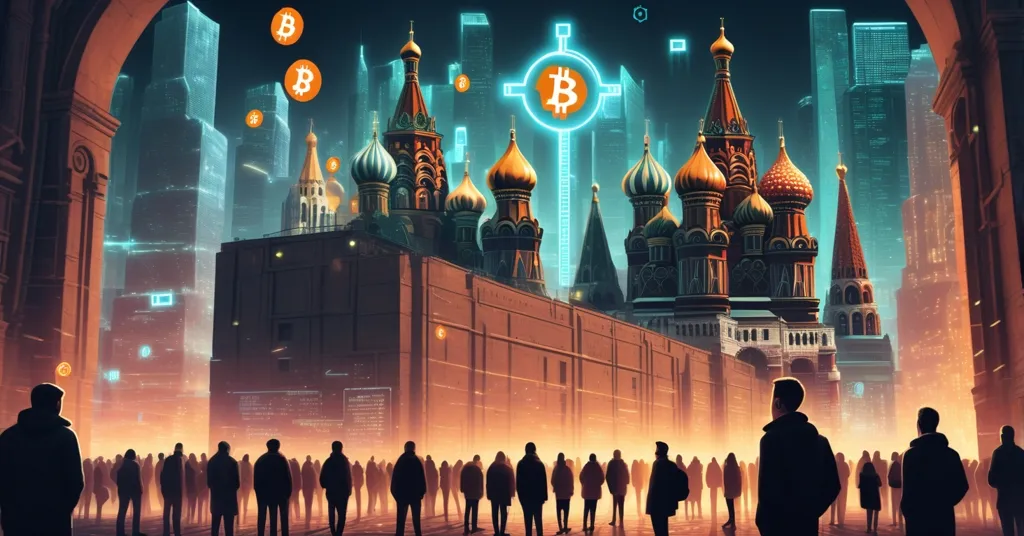Russia’s Crypto Paradox: High Awareness, Low Ownership, and Regulatory Struggles

Crypto in Russia: High Awareness, Low Ownership, and a Regulatory Tightrope Walk
Russia’s relationship with cryptocurrency is a fascinating paradox: while a staggering 80% of the population knows about digital assets like Bitcoin, only a tiny fraction—3-5%—actually owns any. A recent survey sheds light on this disconnect, revealing a nation intrigued by crypto’s potential yet paralyzed by risks, regulatory roadblocks, and a government playing a cautious game of control. As the Central Bank of Russia eyes full regulation by 2026, the question looms—will this unlock a financial revolution or just tighten the leash on decentralization?
- Knowledge vs. Action: 80% of Russians are aware of crypto, but only 3-5% in the 25-50 age group own it.
- Roadblocks: Volatility, legal uncertainty, and tech risks keep most on the sidelines.
- State Moves: Central Bank plans comprehensive crypto rules by 2026 amid slow policy shifts.
The Survey Says: Curiosity Abounds, Wallets Stay Empty
A comprehensive poll conducted by Выберу.ру, an online financial comparison platform, and the Russian branch of IT Smart Finance, surveyed 2,500 individuals and uncovered a striking gap in Russia’s crypto landscape. Awareness is sky-high—80% of Russians know about cryptocurrencies, a figure that speaks to the pervasive buzz around Bitcoin and its ilk, even in a country under economic strain from sanctions since 2022, as highlighted in a recent report on crypto awareness among Russians. Yet, when it comes to ownership, the numbers plummet. Only 3-5% of those aged 25 to 50 have digital coins in their wallets, while just 10% express readiness to invest. Why the hesitation? Let’s unpack the motivations and the massive barriers.
On the allure side, 60% of respondents pointed to high profitability as crypto’s biggest draw. In a nation where traditional investments can be hampered by currency devaluation and restricted access to global markets, the promise of outsized returns is a siren call. Another 35% value the independence from banking systems—a huge factor given how sanctions have cut many Russians off from international finance, making decentralized assets like Bitcoin a potential lifeline. Then there’s the 30% who appreciate the 24/7 global trading access, a feature that lets anyone with an internet connection trade without borders or bank hours. It’s financial freedom on steroids, at least in theory.
Barriers as High as the Kremlin Walls
But theory crashes hard against reality. The survey found that 45% of Russians see extreme volatility as the top risk, and they’re not exaggerating—crypto prices can nosedive 30-50% in hours, wiping out savings faster than a Moscow winter freezes pipes. Take the May 2022 Bitcoin crash, for instance, where a single day saw losses equivalent to tens of thousands of rubles for small investors. It’s a gamble most aren’t willing to take. Worse still, 80% are deterred by regulatory uncertainty, unsure if their investments will be deemed illegal overnight. And 19% worry about tech threats—exchange hacks, phishing scams, and fraudulent projects that litter the crypto space like landmines. For the uninitiated, managing private keys (your digital password to access funds) or navigating decentralized exchanges (peer-to-peer trading platforms, often called DEXs) feels like defusing a bomb with no manual. One wrong move—say, losing your key or clicking a shady link—and your money’s gone for good.
Let’s not sugarcoat it: the crypto world is a cesspool of scams alongside its brilliance. From pump-and-dump schemes to fake initial coin offerings (ICOs), bad actors prey on the hopeful, and Russia’s no exception. Without basic education on securing assets or spotting fraud, the average person’s right to be skeptical. Hell, even seasoned players get burned—remember the 2019 WEX exchange collapse, a Russian-linked platform that vanished with millions? It’s no surprise trust is a rare commodity here.
State Control vs. Decentralized Defiance
Russia’s government isn’t exactly rolling out the red carpet for crypto either. Access to digital assets is tightly restricted under an “experimental legal regime” (ELR), a fancy term for a state-controlled sandbox. Only “highly qualified” investors—typically those with significant income or assets, though exact thresholds remain opaque—can legally dabble in crypto. The rationale? Likely a mix of protecting retail investors from ruin and preventing capital flight or illicit use. For most Russians, this means either staying out or going underground, and the latter seems popular. Estimates suggest up to 20 million citizens hold over $40 billion in crypto assets, a jaw-dropping sum that screams defiance of state rules. Bitcoin doesn’t give a damn about borders or edicts, and that’s precisely why it resonates in a place where financial systems often feel like extensions of state power.
But here’s the flip side: that $40 billion isn’t all noble savings. Russia’s reputation as a hub for cybercrime—think ransomware attacks often paid in Bitcoin—means some of this wealth likely ties to illicit activity. Could this justify the state’s iron grip? Playing devil’s advocate, heavy regulation might be less about stifling freedom and more about curbing a shadow economy that’s hard to track. It’s a bitter pill for decentralization purists, but a valid concern when your nation’s already under global scrutiny.
Central Bank’s Slow Dance with Crypto
Despite the hardline stance, the Central Bank of Russia (CBR) is showing signs of pragmatism. In May, they authorized crypto derivatives—complex financial instruments tied to digital asset prices—for high-income investors, a baby step toward integration. More recently, they’ve hinted at allowing banks to engage with crypto, though details are scarce. Will banks custody assets, facilitate trading, or roll out a digital ruble to compete with decentralized coins? We don’t know yet, but it’s a shift from outright hostility. Looking ahead, the CBR aims for comprehensive regulation by 2026, a timeline suggesting they’re not ignoring crypto’s staying power but want to tame it on their terms. Problem is, 2026 is an eternity in crypto time. While Russia drags its feet, nations like the UAE and even the EU are racing to build blockchain-friendly ecosystems. Could this delay push Russian tech talent and capital elsewhere? It’s a risk worth pondering.
Meanwhile, Russian traders aren’t waiting for permission. A separate RBC poll found over 30% are buying during the current Bitcoin dip, seeing slumps as bargains rather than warnings. Is this driven by desperation amid economic hardship or genuine belief in long-term value? Contrast this with Western traders, often motivated by speculation or portfolio diversification, and you see Russia’s unique stakes—crypto isn’t just an investment; for some, it’s survival. Usage stats back this up: 19% of Russians have used crypto more than once, and 7% plan to soon, per an October survey. Small numbers, but a creeping cultural shift nonetheless.
A Quick Primer for Newcomers
If you’re new to this space, let’s break it down. Cryptocurrencies like Bitcoin run on blockchain technology, a decentralized ledger spread across thousands of computers worldwide. No bank or government controls it, which is why it’s both liberating and chaotic. Your funds are secured by a private key—think of it as a digital vault code. Lose it or get hacked, and you’re out of luck; there’s no customer service to call. Volatility means wild price swings, often fueled by speculation or news (a tweet can tank or spike a coin). And regulatory uncertainty? That’s the limbo where laws haven’t caught up, leaving users guessing if their stash is legal or not. In Russia, the state’s “experimental” approach keeps most locked out, a cautious play that frustrates as much as it protects.
Historical Context and Global Parallels
Russia’s crypto saga didn’t start yesterday. Post-2014 sanctions after the Crimea annexation, interest in alternatives to the ruble grew as access to global markets shrank. By Bitcoin’s 2017 boom, murmurs of adoption clashed with government bans on crypto payments, a seesaw that’s defined policy ever since. Compare this to other sanctioned nations—Iran and Venezuela have leaned hard into crypto to dodge economic isolation, with state-backed digital currencies or Bitcoin mining operations. Russia’s more restrained, perhaps due to its larger economy and tighter grip on financial flows, but the hunger for decentralization is the same. It’s not just tech; it’s a quiet rebellion against being boxed out of the world’s financial supermarket.
Bitcoin’s Edge and Altcoin Niches
From a Bitcoin maximalist lens, there’s no purer tool for financial sovereignty than BTC itself. Its borderless, un-censorable nature is a direct challenge to state overreach, especially in a place like Russia where accounts can be frozen on a whim. But let’s not pretend Bitcoin does it all. Altcoins—alternative cryptocurrencies—fill gaps BTC doesn’t touch. Ethereum’s smart contracts could power underground economies or decentralized apps beyond state surveillance. Privacy coins like Monero offer anonymity for those dodging trackers, often paired with VPNs to shield online activity. While Bitcoin remains king for value storage and raw defiance, these other protocols carve out vital niches in a fight for freedom. Dismissing them outright would be shortsighted.
The Bigger Picture: Freedom or Fiasco?
Russia’s crypto story boils down to a tug-of-war between innovation and restriction. The appeal is raw—sanctions, ruble instability, and global exclusion make decentralized money more than a fad; it’s a necessity for some. Picture a St. Petersburg freelancer paid in Bitcoin because SWIFT transfers are blocked. That’s real. But the risks are just as visceral. Without clear laws or investor safeguards, one bad trade or hack can ruin lives. And the state’s not wrong to worry about misuse—crypto’s anonymity can cloak everything from tax evasion to worse. The $40 billion in holdings proves decentralization doesn’t wait for approval, but will 2026’s regulations nurture this energy or neuter it? If they’re too draconian, Russia risks missing the blockchain wave while others sprint ahead. If too lax, they invite chaos. It’s a high-stakes balancing act, and 20 million Russians are already placing their bets.
Key Questions and Takeaways
- Why do so many Russians know about crypto but so few own it?
While 80% are aware, only 3-5% own crypto due to fears of extreme volatility (cited by 45%), regulatory uncertainty deterring 80%, and tech risks like hacks (noted by 19%). - What draws Russians to crypto despite the hurdles?
High profitability (60%), independence from banking systems (35%), and 24/7 global trading access (30%) are top motivators, especially under economic sanctions. - How is Russia’s government handling crypto growth?
The Central Bank limits access to “highly qualified” investors, but recent moves like authorizing derivatives and planning bank integration signal a shift, with full rules eyed for 2026. - Is crypto a real alternative for Russians under current laws?
With 20 million holding over $40 billion despite restrictions, it’s already a workaround, though legal ambiguity and lack of protections pose serious risks. - Are Russian traders optimistic about crypto markets?
Over 30% are buying during Bitcoin dips, showing a bold streak—whether from necessity or belief in future gains—amid uncertain times. - Could delayed regulation hurt Russia’s place in blockchain innovation?
A 2026 timeline risks lagging behind nations building crypto hubs now, potentially driving talent and capital abroad if rules stifle rather than support growth.



